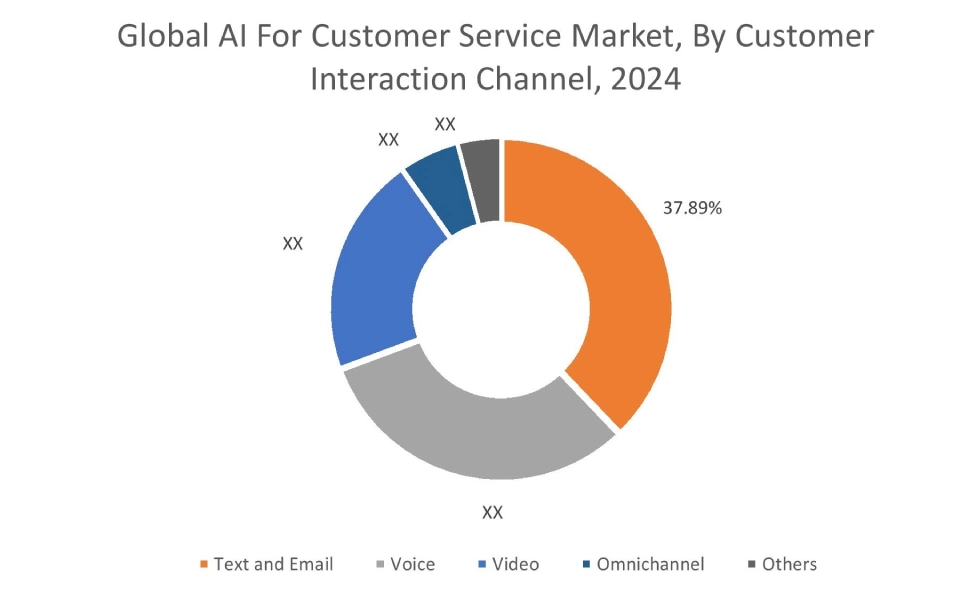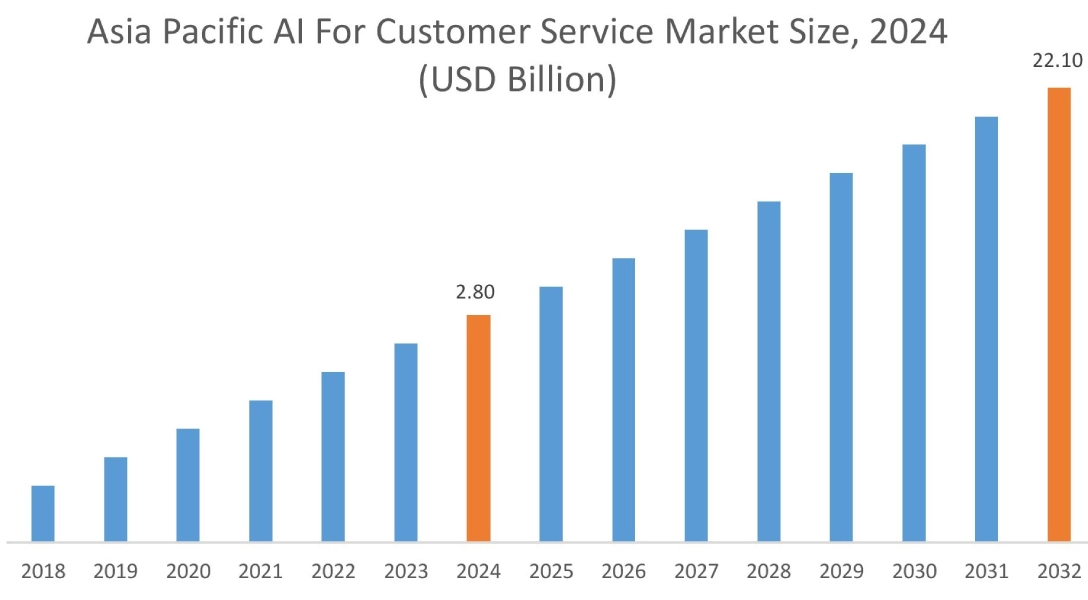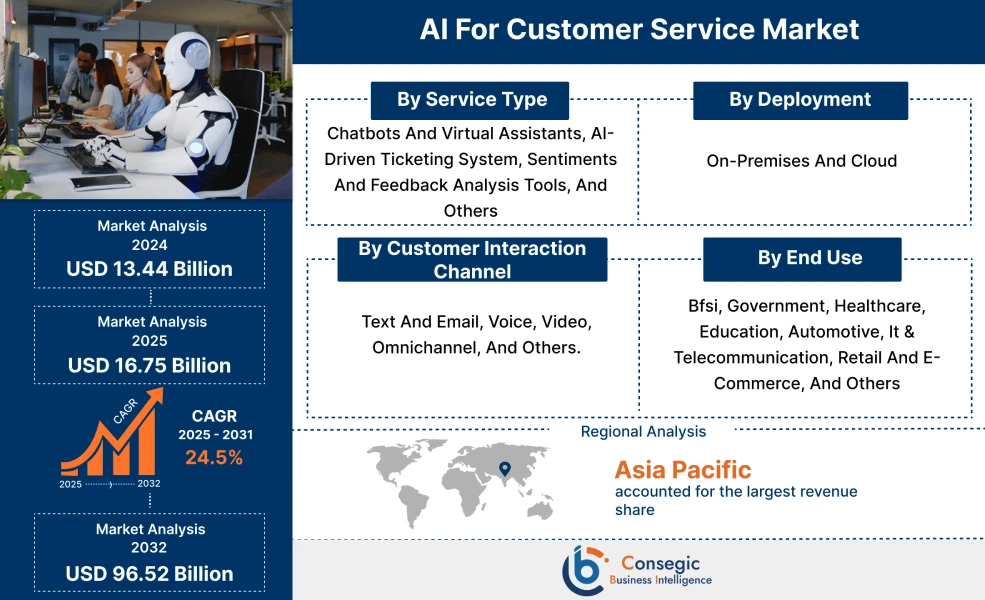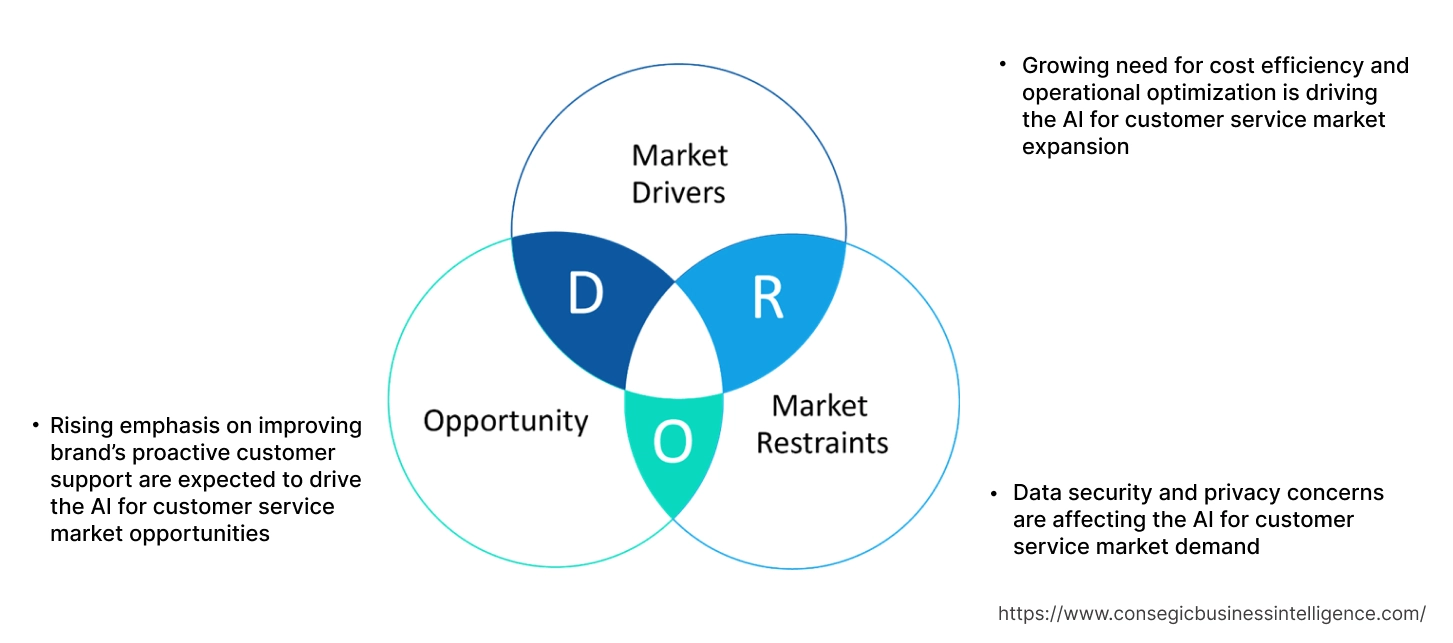AI For Customer Service Market Size:
AI For Customer Service Market Size is estimated to reach over USD 96.52 Billion by 2032 from a value of USD 13.44 Billion in 2024 and is projected to grow by USD 16.75 Billion in 2025, growing at a CAGR of 24.5% from 2025 to 2032.
AI For Customer Service Market Scope & Overview:
Artificial intelligence (AI) can provide efficient and personalized customer service experiences. Combining AI and customer service allows users to provide real-time assistance, automate data collection and analysis, and find prospects for process optimization. AI-powered tools such as chatbots and virtual assistants can handle common customer inquiries, provide instant responses to FAQs, and assist with tasks such as order tracking, product recommendations, and basic troubleshooting. This frees up human agents to focus on more complex or sensitive issues.
AI For Customer Service Market Dynamics - (DRO) :
Key Drivers:
Growing need for cost efficiency and operational optimization is driving the AI for customer service market expansion
By automating routine tasks such as answering frequently asked questions, processing transactions, and resolving common issues, AI solutions help in significantly reducing operational costs. This automation enables customer service representatives to focus on more complex and high-value interactions, thereby increasing productivity and service quality. Additionally, AI's ability to analyze large volumes of data in real-time helps businesses to identify trends, predict future customer needs, and make informed decisions, ultimately leading to cost-saving opportunities and improved return on investment.
- For instance, in June 2025, Amazon rolled out a new core AI forecasting model for its supply chain, designed to accurately predict customer demand for hundreds to millions of products daily. This sophisticated AI anticipates what customers will want, where they will want it, and exactly when will they want it. By analyzing unique regional preferences, Amazon can cater precisely and efficiently to the diverse needs of different communities. This advanced forecasting has already led to significant improvements. The result has increased productivity across their network and a reduced carbon footprint.
Thus, according to the AI for customer service market analysis, the growing need for cost efficiency and operational optimization is driving the AI for customer service market size.
Key Restraints:
Data security and privacy concerns are affecting the AI for customer service market demand
As AI technologies rely on processing large volumes of customer data, ensuring the security and privacy of this data is critical. Businesses need to implement robust security measures and comply with relevant regulations to protect customer data and prevent breaches. Additionally, the potential for bias in AI algorithms poses a threat to the fairness and accuracy of AI-driven customer service solutions. Thus, the aforementioned factors would further impact on the AI for customer service market size.
Future Opportunities :
Rising emphasis on improving brand's proactive customer support are expected to drive the AI for customer service market opportunities
The increasing corporate focus on brand image is set to drive up demand for generative AI solutions. Companies are using these solutions to enhance their proactive customer support. By analyzing user behavior, browse habits, and past interactions, generative AI can anticipate client needs and respond proactively. This not only boosts customer satisfaction and loyalty but also significantly improves overall customer fulfillment. This also enhances customer satisfaction and drives loyalty and retention. Additionally, AI technologies enable businesses to offer 24/7 customer support, handle multiple interactions simultaneously, and improve response times, further enhancing the customer experience.
- For instance, a Gladly survey conducted on 2021 revealed that 82% of consumers were willing to pay more for companies offering excellent customer service. This highlights a trend among businesses to enhance their proactive customer support.
Thus, based on the above AI for customer service market analysis, the rising emphasis on improving brand’s proactive customer support are expected to drive the AI for customer service market opportunities.
AI For Customer Service Market Segmental Analysis :
By Service Type:
Based on service type, the AI for customer service market is segmented into chatbots and virtual assistants, AI-driven ticketing system, sentiments and feedback analysis tools, recommendation systems, visual and diagnostic tools, workflow automation, and others.
Trends in the service type:
- As companies look to integrate AI technologies into their customer service operations, they often require specialized expertise to guide them through the process. This has led to a growing demand for services that can help businesses identify the best AI solutions and develop a strategic implementation plan.
- The ongoing digital transformation across various industries has further accelerated the adoption of chatbot technologies as companies strive to enhance their online presence and streamline their customer interaction processes.
- Thus, based on the above analysis, these factors are driving the AI for customer service market demand.
The chatbots and virtual assistants segment accounted for the largest revenue in the year 2024.
- Modern chatbots are becoming increasingly sophisticated, capable of understanding and processing human language with a high degree of accuracy. This has led to the development of chatbots that can engage in more natural and intuitive conversations, thereby improving user experience.
- With social distancing measures and lockdowns in place, many businesses faced unprecedented challenges in maintaining customer service levels. Chatbots emerged as a viable solution to bridge the gap, providing uninterrupted customer support and information distribution.
- For instance, in May 2025, Airbnb introduced an AI for customer service bot in the U.S. This bot leverages sophisticated AI capabilities to deliver personalized recommendations to users, based on their individual preferences and past behaviours. To achieve this, Airbnb gathered extensive data through, which are essentially user profiles that help the system understand each customer's travel context and inclinations.
- Thus, based on the above analysis, these factors are further driving the AI for customer service market growth.
The workflow automation segment is anticipated to register the fastest CAGR during the forecast period.
- Workflow automation provides a solution by automating repetitive tasks, thereby freeing up human resources for more strategic roles. This not only results in cost savings but also leads to improved accuracy and efficiency in business processes.
- The integration of artificial intelligence and machine learning within workflow automation solutions is further propelling the market, as these technologies enable predictive analytics and decision-making capabilities, enhancing the overall effectiveness of automated workflows.
- As organizations increasingly shift from traditional on-premise systems to cloud-based infrastructure, the demand for cloud-based workflow automation solutions is on the rise. These solutions enable businesses to automate their processes with minimal IT overhead and provide easy access to data and applications from any location, which is particularly beneficial in the modern era of remote work and global business operations.
- Thus, based on the above analysis, these factors are expected to drive the AI for customer service market share during the forecast period.
By Deployment:
Based on the deployment, the AI for customer service market is segmented into on-premises and cloud.
Trends in the deployment:
- As AI technologies continue to evolve, businesses are likely to adopt a hybrid approach, leveraging the benefits of both on-premises and cloud deployment to optimize their customer service operations.
- The growing popularity of cloud deployment is driven by the increasing availability of advanced cloud platforms and services.
The on-premises segment accounted for the largest revenue share in the year 2024.
- The on-premises deployment mode involves installing AI customer service solutions on the company's own servers and infrastructure.
- Moreover, on-premise deployment mode is preferred by organizations that require a high level of control over their data and systems.
- On-premises solutions offer enhanced data security and privacy, making them ideal for industries such as BFSI, healthcare, and others, where data sensitivity is paramount.
- Thus, these factors would further supplement the AI for customer service market
The cloud segment is anticipated to register the fastest CAGR growth during the forecast period.
- Cloud platforms offer the ability to scale resources up or down based on demand, ensuring that businesses can handle varying workloads efficiently.
- This flexibility is particularly important in customer service operations, where the volume of customer interactions can fluctuate significantly.
- Additionally, cloud deployment offers the advantage of easy updates and maintenance, as cloud service providers handle the infrastructure and ensure that AI applications are always up-to-date with the latest features and security patches.
- These developments in the cloud segment are anticipated to further drive the AI for customer service market trends during the forecast period.
By Customer Interaction Channel:
Based on customer interaction channel, the market is segmented into text and email, voice, video, omnichannel, and others.
Trends in the customer interaction channel:
- Companies are effectively leveraging AI for customer service, which can offer superior experiences, leading to higher customer satisfaction and retention.
- The increasing reliance on digital communication (chat, messaging, social media) aligns perfectly with AI's strengths, while driving the need for AI for customer service.
The text and email segment accounted for the largest revenue share of 37.89% in the year 2024.
- The sheer volume of customer emails, chat logs, and social media messages provides a rich dataset for AI models to learn from, making them increasingly intelligent and accurate. AI excels at processing and deriving insights from this unstructured text data, which individuals cannot do at scale.
- By analysing vast amounts of customer data (past purchases, browse history, previous interactions, stated preferences, passports or user profiles), AI can tailor the language, tone, and content of emails and chat messages.
- AI can rapidly summarize lengthy email threads or chat histories for human agents, providing them with immediate context before they engage with a customer, significantly reducing resolution times.
- Thus, the aforementioned factors are driving the AI for customer service market growth.
The voice segment is anticipated to register the fastest CAGR during the forecast period.
- Voice AI systems are capable of personalizing conversations based on real-time data, caller ID, past interactions, and stated preferences. It can customize greetings, relevant offers, and solutions specific to the customer's history.
- Moreover, AI systems can provide real-time call transcription, knowledge base lookups, sentiment alerts, and suggested responses directly to agents during live calls.
- These factors are anticipated to further drive the AI for customer service market trends during the forecast period.

By End Use:
Based on end use, the market is segmented into BFSI, government, healthcare, education, automotive, IT & telecommunication, retail and e-commerce, education, manufacturing, travel & hospitality, and others.
Trends in the end use:
- AI technologies are being used to analyze customer feedback and preferences, enabling travel and hospitality providers to offer personalized services and improve customer loyalty.
- By automating routine tasks, telecom companies can focus on more complex issues, thereby improving overall service efficiency and customer satisfaction. AI technologies also help in analyzing customer behaviour and preferences, enabling telecom companies to offer tailored services and promotions.
The BFSI segment accounted for the largest revenue share in the year 2024 and it is expected to register the highest CAGR growth during the forecast period.
- The BFSI industry is a major adopter of AI technologies, driven by the need to enhance customer experience, improve operational efficiency, and ensure data security.
- AI-powered chatbots and virtual assistants are widely used in BFSI to provide instant responses to customer queries, process transactions, and offer personalized financial advice.
- Additionally, predictive analytics and fraud detection applications help BFSI organizations identify potential risks and prevent fraudulent activities.
- Thus, the above developments in the BFSI industry are driving the global market trends.
Regional Analysis:
The global market has been classified by region into North America, Europe, Asia-Pacific, Middle East & Africa, and Latin America.

Asia Pacific AI for customer service market expansion is estimated to reach over USD 22.10 billion by 2032 from a value of USD 2.80 billion in 2024 and is projected to grow by USD 3.52 billion in 2025. Out of this, the China market accounted for the maximum revenue split of 36.88%. This growth is driven by the rapid digital transformation, increasing internet penetration, and the growing need for efficient customer management solutions in emerging economies. Countries in the region are leading the adoption of AI technologies, with businesses across various industries investing in AI to enhance customer experience and improve operational efficiency. Further, the region's favorable economic environment, coupled with government initiatives to promote AI research and development, is expected to drive significant growth in the regional market. These trends would further drive the regional AI for customer service market during the forecast period.
- For instance, in May 2023, Infosys launched a suite of AI services, Infosys Topaz, using generative AI that can augment human capabilities and open new prospects in the enterprise space. Infosys Topaz leverages the company's AI framework to help customers build an AI core to deliver cognitive solutions.

North America market is estimated to reach over USD 38.51 billion by 2032 from a value of USD 5.39 billion in 2024 and is projected to grow by USD 6.71 billion in 2025. North America is expected to dominate the market, driven by the early adoption of advanced technologies and presence of major AI solution providers. The region's strong technological infrastructure and high investment in AI research and development have facilitated widespread implementation of AI-powered customer service solutions. Furthermore, the increasing focus on enhancing customer experience among enterprises is expected to drive market growth. These factors would further boost the market in North America.
According to the analysis, the AI for customer service industry in Europe is anticipated to witness significant development during the forecast period. The region's regulatory framework, which emphasizes data protection and privacy, also influences the adoption of AI in customer service, with businesses prioritizing compliance and security in their AI implementations. Additionally, Latin American businesses are increasingly leveraging AI technologies to improve customer engagement, streamline operations, and gain competitive advantage. Further, the high level of customer expectations and competitive business landscape is further driving the adoption of AI technologies in customer service in the Middle East & Africa region.
Top Key Players and Market Share Insights:
The global AI for customer service market is highly competitive with major players providing solutions and services to the national and international markets. Key players are adopting several strategies in research and development (R&D), product innovation, and end-user launches to hold a strong position in the market. Key players in the AI for customer service industry include-
- Atlassian (Australia)
- Google (U.S.)
- Servicenow (India)
- Sprinkler (U.S.)
- Zendesk (U.S.)
- IBM (U.S.)
- AWS (U.S.)
- Microsoft (U.S.)
- OpenAI (U.S.)
- Salesforce (U.S.)
- SAP (Germany)
AI For Customer Service Market Report Insights :
| Report Attributes | Report Details |
| Study Timeline | 2019-2032 |
| Market Size in 2032 | USD 96.52 Billion |
| CAGR (2025-2032) | 24.5% |
| By Service Type |
|
| By Deployment |
|
| By Customer Interaction Channel |
|
| By End Use |
|
| By Region |
|
| Key Players |
|
| North America | U.S. Canada Mexico |
| Europe | U.K. Germany France Spain Italy Russia Benelux Rest of Europe |
| APAC | China South Korea Japan India Australia ASEAN Rest of Asia-Pacific |
| Middle East and Africa | GCC Turkey South Africa Rest of MEA |
| LATAM | Brazil Argentina Chile Rest of LATAM |
| Report Coverage |
|
Key Questions Answered in the Report
How big is the AI For Customer Service Market? +
AI For Customer Service market size is estimated to reach over USD 96.52 Billion by 2032 from a value of USD 13.44 Billion in 2024 and is projected to grow by USD 16.75 Billion in 2025, growing at a CAGR of 24.5% from 2025 to 2032.
Which is the fastest-growing region in the AI For Customer Service Market? +
Asia-Pacific region is experiencing the most rapid growth in the market.
What specific segmentation details are covered in the AI For Customer Service report? +
The AI for customer service report includes specific segmentation details for service type, deployment, customer interaction channel, end use, and region.
Who are the major players in the AI For Customer Service Market? +
The key participants in the market are Atlassian (Australia), Google (U.S.), IBM (U.S.), AWS (U.S.), Microsoft (U.S.), OpenAI (U.S.), Salesforce (U.S.), SAP (Germany), Servicenow (India), Sprinkler (U.S.), Zendesk (U.S.), and others.


